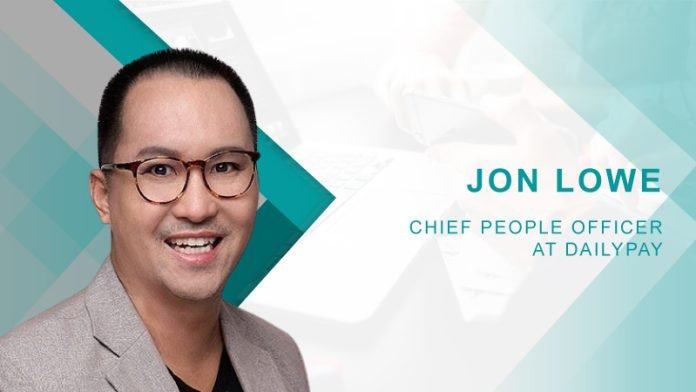Jon, could you kindly share insights into your professional journey and shed light on how you assumed the role of Chief People Officer at DailyPay?
While I wish I could say that my journey to DailyPay was linear and a byproduct of thoughtful planning and careful execution; it was equal part good fortune, and hard work with the benefit of exceptional coaching and stewardship of other great HR leaders.
My career started initially in industrial relations and collective bargaining then took me to big tech and then the startup / fintech world. In each of the spaces and roles I learned more about the operating environments where I play best, and where I can create value.
Beyond pushing for professional development, one element that has become much more front of mind is the importance of being deliberate and introspective about ensuring that there is strong alignment between the work you do and personal values.
As a recent immigrant to the US, I underestimated the challenges of gaining access to even basic financial services. This experience was a stark reminder of the inequity of access to services faced by people who operate outside the standard norms of the banking and financial services space. This experience weighed heavily in my election to join DailyPay and my alignment to the mission of the organisation.
In the realm of financial equity, could you elaborate on how DailyPay actively contributes to fostering diversity, equity, and inclusion within the workforce?
Access to basic financial literacy tools and resources have been unevenly distributed in our society. DailyPay is looking to fill that void enabling financial equity and inclusion for all. Financial equity and inclusion speak to prioritizing that your workforce has equal access to professional opportunities, financial products, and services within the organization.
DailyPay partners with America’s leading and forward-thinking employers to improve the financial equity and well-being of their workforce by offering the financial wellness benefit of earned wage access (EWA) to their employees.
With EWA, employers can empower their employees with choice and control over their earned pay to pay bills, spend, save, or invest on their own schedule, not an arbitrary payday. DailyPay’s technology platform allows employees to have the utmost pay transparency into their earnings, knowing exactly how much they’ve earned after each work shift. It also allows employees to seamlessly transfer their earned pay to any bank account, debit card, or pay card at the push of a button for a small ATM-like fee or no fee at all. This low-cost and no-cost option is a considerably better option than the exorbitant fees associated with payday loans or paying overdraft fees to make ends meet.
Additionally, through the DailyPay application, employees can access critical financial wellness tools such as financial coaching, completely free of charge.
DailyPay is dedicated to enhancing the financial equity of the workforce. Would you mind expanding on the specific challenges you aim to address and the positive impact you’ve observed thus far?
American household debt has never been higher according to the Federal Reserve. Sadly, millions of Americans are struggling each month to make ends meet. In many cases, the ability to pay a bill comes down to something as simple as the timing of your paycheck. With DailyPay, employees no longer have to worry if their bills align perfectly with their company’s pay cycle. They have the flexibility to pay bills on their own schedule, as needed, by accessing their earned pay at any time – 24 hours a day.
The data shows it’s helping. Recent research from Arizent/ Employee Benefits News shows that six out of 10 users who previously incurred credit card interest charges do this less often or stopped completely since they started using DailyPay.
How does DailyPay’s technology platform empower employees, especially those who may be unbanked or underbanked, ensuring they have equal access to financial products and services?
The unbanked population is made up of around 13 million people in the U.S. In an effort to provide financial equity to the millions of Americans who are unbanked or underbanked, DailyPay created ‘Friday’, a general purpose reloadable (GPR) prepaid card and app that makes financial transparency and control available to millions of hard-working Americans. Friday offers the benefits of banking with no minimum balance requirement and no maintenance fees. With Friday, the card users have no-fee instant access to their earned wages which empowers them with financial control and allows them to avoid having to use expensive alternatives. Friday also provides employers with a way to extend the advantages of DailyPay to more employees and enhance their ability to make different financial decisions that lead to improved financial wellness.
In your perspective, what role do you envision for employers in enhancing financial equity, and how can on-demand pay strengthen the relationship between employers and their workforce?
Employers play a pivotal role in enhancing the financial equity of their workforce. In today’s workforce, employees are looking to their employers to offer flexibility and meaningful benefits. Employers must remain innovative and look to adapt new benefits that directly impact the well-being of their employees to attract and retain talent in what is still a tight labor market for many industries. EWA is one such benefit that has emerged as a must-have for employees in times of economic uncertainty with continued high inflation and housing costs.
According to recent research from Arizent/Employee Benefits News, over 7 of 10 (73%) of employers say DailyPay is important or a cornerstone to their financial wellness benefits, while over 9 of 10 (93%) of employers say DailyPay provides a valuable addition to their suite of benefits. The result? Employees are more productive, happier on the job, and ultimately stay longer.
Recognising the benefits for unbanked or underbanked individuals, could you elaborate on how providing on-demand pay significantly contributes to improving their financial well-being?
Unlocking the power of on-demand pay through DailyPay’s Friday card is a first step for many on a journey toward financial wellness. For the first time, many unbanked Americans can be more participatory in the financial system through DailyPay’s Friday card, which provides employees with no-fee instant access to their earned wages. With this employer-sponsored benefit, they are now empowered with financial control which allows them to avoid having to use expensive alternatives.
The goal for those with the Friday card is to eventually see the user sign up for an account with a bank to build savings and a nest egg for the future.
Drawing from your experiences, what challenges have employers encountered in achieving financial equity, and how has DailyPay adeptly addressed or overcome these challenges?
Twelve million Americans turn to predatory payday loans to make ends meet each year. In fact, there are 23,000 payday lenders in the U.S. which is twice the number of McDonald’s restaurants. The average payday loan borrower is in debt for five months of the year, with 1 in 5 borrowers defaulting on their payday loan. This creates a vicious cycle of debt… borrowers feel trapped. They are constantly stressed, not knowing if they can make that next payment. DailyPay can be the solution to these predatory loans. According to research from Aite Novarica Group commissioned by DailyPay, 95% of those who were previously reliant on payday loans in any way either stopped using payday loans (81%) or reduced use (15%) after using DailyPay. Nearly nine out of 10 (88%) of those responding said that they stopped or reduced the use of such loans because of DailyPay.
On a personal level, how do you approach the challenge of fostering financial equity, and what guiding strategies inform your decisions as the Chief People Officer?
On a personal (and professional) level, I view the fostering of financial equity as a two part nut. On one hand there are the core elements of a well running compensation/rewards program which should be reviewed frequently and from the vantage point of multiple dimensions to ensure equity in the program.
Where things become more interesting is peeling the onion further to evaluate where CHRO’s/CPO’s can create value for their employees by understanding their needs and catering their approach. Obviously there isn’t a one-size-fits-all approach that can be applied – but starting from the employee and working backward represents a good starting point in ensuring that programs and financial wellness mechanisms are working as intended.
Some core areas that are often overlooked are the deployment of existing benefits programs vis-a-vis wellness programing to aid with driving financial literacy, assessment and engagement with 401K providers to provide insight into savings programs; and even EAP providers to ensure that corporate sponsored safety net programs are understood and leveraged as needed. Again, it’s case-by-case based on the organisation, but there are may ways existing programs can be leveraged in non-conventional ways to yield value for employees.
Given your rich experiences, what thoughtful advice would you offer to people leaders and HR professionals striving to enhance financial equity within their organisations?
HR sits at the command center as it relates to driving employee experience and how the business interacts with its employees. That said, continue to advocate for your employees bringing new, useful, and innovative solutions to the frontlines.
As we conclude, would you kindly share any final reflections or key takeaways regarding the intersection of financial equity, diversity, and inclusion in the workplace?
I’m thrilled to work for a mission-driven organization such as DailyPay that is making such a positive impact in the lives of so many.
Explore HRtech News for the latest Tech Trends in Human Resources Technology.

Jon Lowe Chief People Officer at DailyPay
Jon Lowe serves as Chief People Officer for DailyPay. Lowe joined DailyPay after serving as Head of U.S. Human Resources at eToro and Head of North American Human Resources at Revolut, two prominent global fintech companies. He also spent more than seven years as an HR leader at Amazon. Lowe is a graduate of Queen’s University where he received his Bachelor of Arts in Economics and Sociology. He holds a Ted Rogers MBA in Strategic Human Resource Management from the Toronto Metropolitan University. Lowe is an active member of the Society for Human Resource Management (SHRM), as well as a former committee member with the Human Resources Professionals Association (HRPA).












